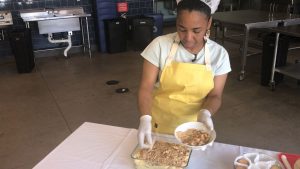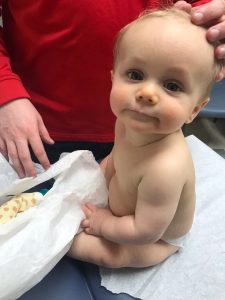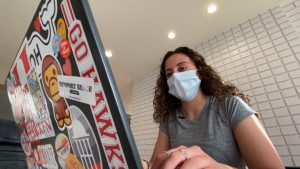NORTHERN KENTUCKY — As the war with Russia wages on in Ukraine, estimated deaths are into the tens of thousands. Many of them are innocent civilians.
A doctor originally from Northern Kentucky who went to Ukraine to help just days into the conflict is about to go back.
Dr. Riley Jones went to Larry A. Ryle High School in Union. He studied organometallic chemistry at Western Kentucky University as an undergraduate and then went to medical school at the University of Louisville.
Jones is now an assistant professor of medicine at the University of Florida. He said he loves and misses Kentucky. His next trip, however, won’t be back to the bluegrass state, but to an active war zone.
Along with his university job, Jones is also a member of the board of directors for the medical humanitarian aid organization MedGlobal. He said the organization formed in response to the Syrian crisis in 2017.
As the Russia and Ukraine conflict escalated, MedGlobal reached out to the Ukrainian Medical Association of North America, as well as Razom, one of the larger Ukrainian civil society organizations which is based out of New York City. MedGlobal shared its experience in dealing with Russian warfare in the past.
Within a few days of the onset of the conflict, the Ukrainian organizations were asking if MedGlobal could go meet with the Ministry of Health in Lviv to help with educational priorities, particularly as they relate to chemical weapons.
MedGlobal sent a team of about 10 people, including Jones, into Ukraine.
Their mission was to help educate health officials and bring about $500,000 worth of situationally appropriate supplies, including combat-related medical supplies, trauma gear and critical care medicine.
“We made it into Lviv by 3:00 a.m., and by 4:30 a.m. we were already under the first air-raid siren. The location we were in did not have a bomb shelter. One of the things you learn is wherever you are, just to pay attention to where the strongest point of the structure is,” Jones said. “About every eight hours, we were under another air-raid siren. The problem is, you never know where a bomb is going to fall, or where a rocket is going to hit, and so you take every single one seriously.”
Jones said one of his Syrian colleagues explained to him the nuances of the sounds of war.
“The bomb that kills you is not the one that you hear. When you can hear the air raid sirens, number one, the bombs have likely already dropped. And they’re not going to drop on you,” Jones said.
Jones said the team became so accustomed to the sound of explosions that not hearing them was scarier.
“Because you can hear the rocket hit, and it sounds like the rocket is hitting the ground, but not exploding the way that the other ones do. And that’s when the chemical attacks are happening. And so while we’re down in this basement, where air sinks to its lowest level, and we’re not hearing these explosions, this is a concern that’s weighing on all of our minds. We don’t know if we’re about to have to rush out of this bomb shelter in order to get to fresh air, and what that’s going to drive us into,” he said.
The mission lasted about five days. Jones said, on its way out, the team transported some injured Ukrainians to Poland using the space the supplies were no longer taking up.
Among the casualties was a family of five that Jones said should’ve been a family of seven. The family included a mother, her sister, her elderly grandfather and their two kids.
Jones said the family was trying to flee Kyiv just a few days earlier on their way to Vinnytsia, a more calm area that’s not as strategically important as a military target.
“And they were intercepted on the road while they were traveling in their car,” he said.
He said the family’s car was clearly marked as civilian with writing all over, and white flags. A large military vehicle approached their car.
“It started shelling them, and then shooting at them before they even approached,” Jones said. “They got out, and they shot into the car. That killed the grandmother. It shot her through the abdomen. They shot a one-year-old child through the eye. And then they shot the rest of the family at rather close range. And then they left the family.”
Jones said the grandfather was able to drag the family out of the car, and took them through the woods to a local village, where they had to hide for two days with their injuries. Eventually, they made it to Lviv.
Jones helped care for the family members that survived.
“The hard part is seeing ten-year-olds with bullet holes through their hands. This young man was holding his hand up to me, and I could see through his hand. And he’s telling me, he hasn’t made the connection. He’s telling me he wants to grow up to be a dentist, and I know that his fingers don’t work,” Jones said. “Seeing shrapnel in the remaining parts of his arm. Huge soft tissue defects. Bones that are just missing from bullet penetration injuries. And these are in kids. And that’s a very hard thing for me to see as a physician.”
Jones said the atrocities he was seeing were hard to stomach.
“There’s some things that you have to just sort of hold onto and deal with when you can. For me, it was very hard taking care of a 10-year-old and a 12-year-old, two brothers, and I know that they no longer have their other sibling or their grandmother. And I’m looking at them, and they’re not much older than my own daughter. To know that less than a month before that, these were kids that were going to school, doing well,” he said.
Jones said he’s concerned about how warfare could continue to escalate in Ukraine. He said he fears the targeting of healthcare facilities, and use of chemical weapons.
Despite those fears, he’s going back in five days to be there for two weeks.
“Because there are some things about the way that the world proceeds that he finds intolerable, that I just can’t find it within myself to accept, and not try to do something about it. So in terms of conflict, I have no misconceptions. I am not going to go save Ukraine. I’m not going to go stop the war, or anything like that,” Jones said. “There will be a lot of people that will die in a crowded square where a bomb drops. And 20 percent of those people might not necessarily need to die. Because they don’t die right away. They die from wound infections, from bleeding that could be stopped. And those are the people that I can help.”
He said he’s aware of the risk, but he has to follow his calling.




